The Azores, a captivating archipelago in the Atlantic Ocean, beckons travelers with its stunning natural beauty, rich cultural heritage, and unparalleled adventures. Immerse yourself in the islands’ volcanic landscapes, temperate climate, and vibrant traditions that have shaped the Azores into a true gem of Portugal.
From its lush green hills and dramatic coastlines to its historic towns and vibrant festivals, the Azores offers an unforgettable experience that will leave a lasting impression.
Azores
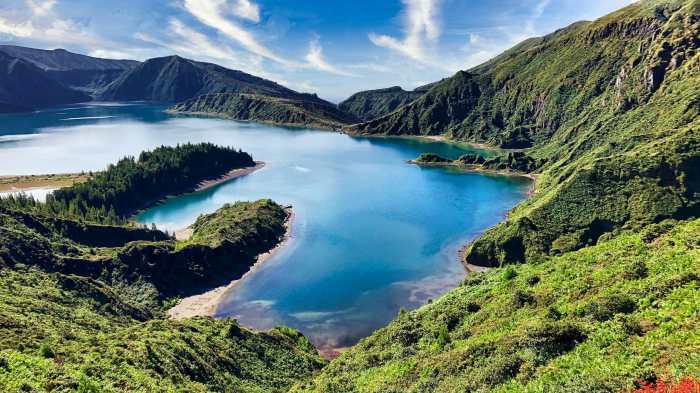
Geographic Overview, Azores
The Azores archipelago is an autonomous region of Portugal located in the North Atlantic Ocean, about 930 miles (1,500 kilometers) west of Lisbon. It comprises nine volcanic islands, divided into three groups: the Eastern Group (São Miguel and Santa Maria), the Central Group (Terceira, Graciosa, São Jorge, Pico, and Faial), and the Western Group (Flores and Corvo).
The islands are of volcanic origin, formed by the Azores hotspot, a volcanic hotspot that has been active for the past 20 million years. The islands are relatively young, with the oldest, Santa Maria, being about 5.2 million years old, and the youngest, Pico, being about 200,000 years old.
| Island | Area (sq km) | Population | Highest Point (m) |
|---|---|---|---|
| São Miguel | 744.6 | 137,830 | Pico da Vara (1,103) |
| Santa Maria | 97.4 | 5,559 | Pico Alto (587) |
| Terceira | 402.2 | 56,455 | Serra de Santa Bárbara (1,023) |
| Graciosa | 60.6 | 4,391 | Caldeira (402) |
| São Jorge | 246.3 | 9,171 | Pico da Esperança (1,053) |
| Pico | 446.6 | 14,148 | Pico (2,351) |
| Faial | 173.1 | 15,063 | Cabeço Gordo (1,043) |
| Flores | 141.4 | 3,907 | Morro Alto (914) |
| Corvo | 17.1 | 430 | Monte Gordo (718) |
Climate and Environment
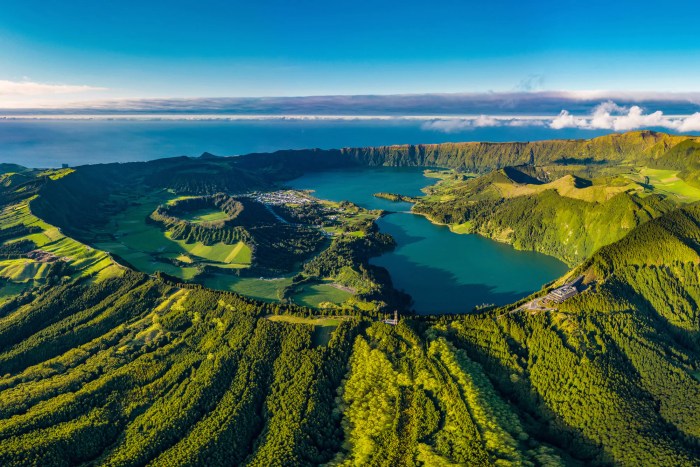
The Azores enjoy a temperate climate year-round, thanks to the moderating influence of the Gulf Stream. Winters are mild, with average temperatures hovering around 15°C (59°F), while summers are warm but not overly hot, with average temperatures in the mid-20s Celsius (70s Fahrenheit). The islands receive plenty of rainfall, which helps to keep the landscape lush and green.
Biodiversity and Endemic Species
The Azores are home to a diverse array of plant and animal life, including many endemic species that are found nowhere else on Earth. The islands’ unique volcanic geology and isolated location have created a haven for these unique organisms. Some of the most notable endemic species include the Azores bullfinch, the Azores jay, and the Azorean limpet.
Environmental Protection
The natural environment of the Azores is of great importance to the islands’ inhabitants and visitors alike. In recent years, there have been increasing efforts to protect the islands’ unique ecosystem. These efforts include the establishment of protected areas, the promotion of sustainable tourism, and the implementation of conservation measures to safeguard the islands’ endemic species.
History and Culture
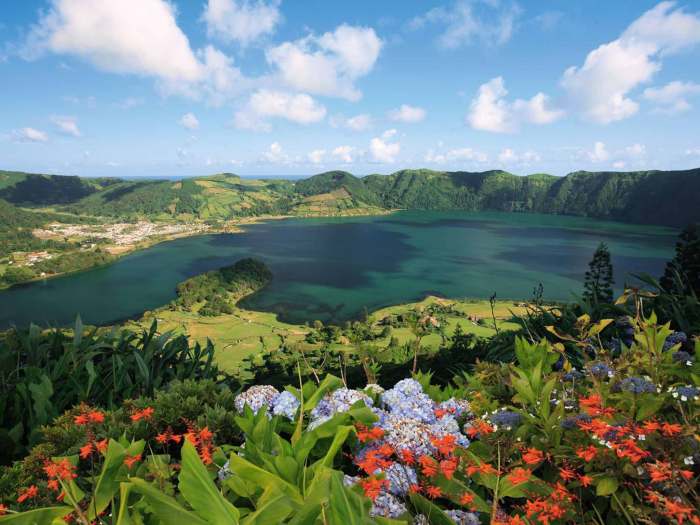
The Azores archipelago holds a rich tapestry of history and culture, shaped by centuries of Portuguese influence and local traditions. Its story begins with early settlement and continues through the era of Portuguese exploration.
Early Settlement and Portuguese Exploration
The first inhabitants of the Azores were Portuguese sailors who arrived in the 15th century. They established settlements on the islands, bringing with them their language, customs, and religious beliefs. Over time, the Azores became a strategic outpost for Portuguese exploration, serving as a base for voyages to Africa, Asia, and the Americas.
Cultural Heritage
The cultural heritage of the Azores is a vibrant blend of Portuguese traditions and local customs. The islands have a strong sense of community, with close-knit families and a shared love of music, dance, and folklore. The local dialect, Azorean Portuguese, is distinct from mainland Portuguese, reflecting the unique history and culture of the islands.
Festivals and Celebrations
Throughout the year, the Azores hosts a variety of festivals and celebrations that showcase its rich cultural heritage. These events include religious processions, traditional music and dance performances, and colorful street parades. Some of the most notable festivals include the Holy Ghost Festival, held in May and June, and the Feast of São Miguel, the patron saint of the Azores, celebrated in September.
Economic Activities
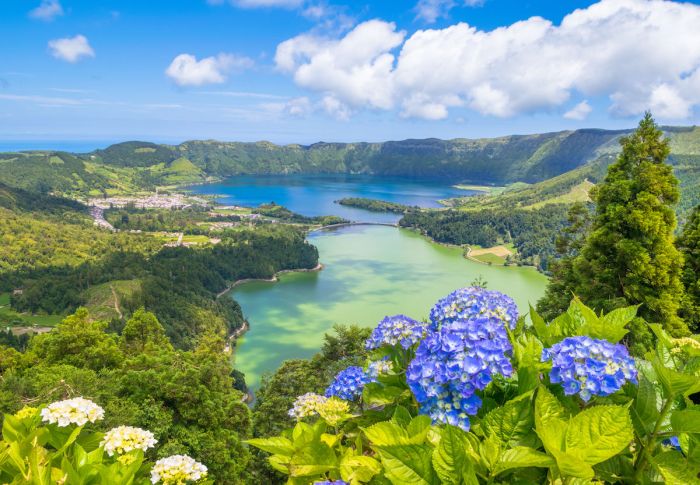
The Azores’ economy is primarily driven by agriculture, tourism, and sustainable practices.
Agriculture plays a crucial role, with dairy farming being the cornerstone of the industry. The islands’ rich volcanic soil and temperate climate provide ideal conditions for grazing, resulting in high-quality milk production.
Tourism
Tourism is another significant economic pillar. The Azores’ breathtaking landscapes, diverse wildlife, and rich cultural heritage make it a popular destination for nature enthusiasts and adventure seekers.
Sustainable Practices
The Azores is committed to sustainable economic practices. The islands have implemented innovative measures such as renewable energy initiatives, waste management programs, and eco-friendly tourism practices.
Transportation and Infrastructure
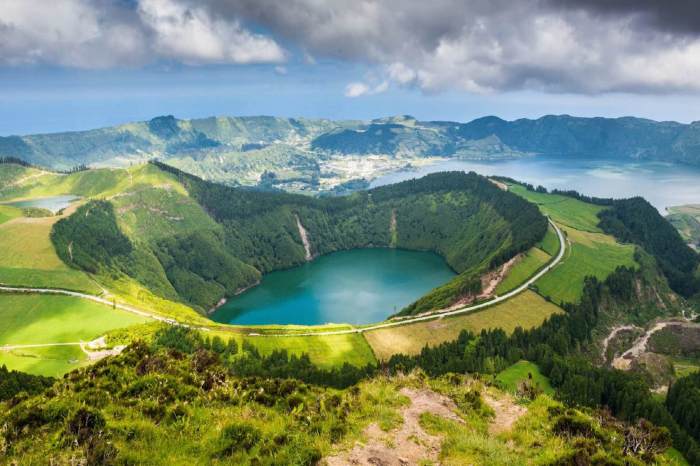
The Azores archipelago boasts a comprehensive transportation network that connects its nine islands, enabling seamless travel for both locals and visitors. This network comprises a combination of air and sea connections, along with well-developed infrastructure on each island, ensuring efficient movement of people and goods.
The region’s air transportation system plays a crucial role in inter-island connectivity. The main airport, located on the island of São Miguel, serves as a hub for both domestic and international flights. Regular flights connect the islands, providing convenient and time-efficient travel options. Additionally, smaller airports on the other islands facilitate intra-archipelago travel, catering to the needs of both tourists and residents.
Sea Connections
Sea connections are another vital component of the Azores’ transportation system. Ferry services operate regularly between the islands, offering a scenic and cost-effective mode of travel. These ferries transport passengers, vehicles, and goods, ensuring the smooth flow of commerce and tourism throughout the archipelago.
Road Infrastructure
The Azores’ road infrastructure has undergone significant development in recent years, resulting in a network of well-maintained roads connecting major towns and cities on each island. These roads facilitate the movement of goods and people, supporting economic activities and tourism. Additionally, bridges and tunnels have been constructed to improve accessibility and reduce travel times.
Communication Networks
The Azores has a modern and reliable communication network that connects the islands and provides access to the internet, telephone, and mobile services. This infrastructure enables efficient communication for both personal and business purposes, contributing to the archipelago’s overall development.
Challenges and Opportunities
While the Azores’ transportation and infrastructure systems are generally well-developed, there are ongoing efforts to address challenges and seize opportunities for improvement. One challenge lies in maintaining and upgrading the existing infrastructure to meet the growing demands of tourism and economic development. Additionally, exploring sustainable transportation options, such as electric vehicles and renewable energy sources, is a priority for the region.
The Azores, a breathtaking archipelago nestled in the Atlantic, is renowned for its stunning landscapes, vibrant culture, and welcoming locals. While the Azores exudes a unique charm, those seeking a vibrant coastal experience can venture to Aguadilla, Puerto Rico.
This coastal gem boasts pristine beaches, crystal-clear waters, and a lively atmosphere. After immersing yourself in the vibrant energy of Aguadilla, return to the tranquil embrace of the Azores, where nature’s beauty unfolds in its full glory.
Tourism and Attractions
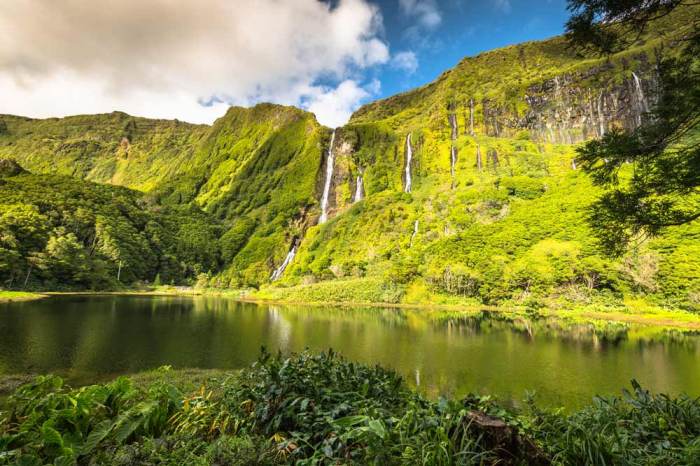
The Azores archipelago boasts an array of natural wonders and cultural heritage that attract tourists from around the world. Its unspoiled landscapes, vibrant marine life, and rich history make it an ideal destination for nature enthusiasts, adventure seekers, and culture lovers alike.
The Azores, an archipelago of volcanic islands in the Atlantic Ocean, boasts a rich natural and cultural heritage. Among its many attractions are several sites designated as UNESCO World Heritage Sites , such as the Pico Island Vineyard Culture Landscape and the Angra do Heroísmo City Centre.
These sites showcase the unique geological, historical, and cultural significance of the Azores, making them must-see destinations for visitors seeking to explore the archipelago’s diverse offerings.
The Azores offers a wide range of tourism activities, catering to diverse interests and preferences. From hiking and biking amidst stunning volcanic landscapes to whale watching and dolphin encounters, the islands provide ample opportunities for outdoor recreation and wildlife viewing. Additionally, historical sites and museums showcase the archipelago’s unique cultural heritage.
Top Tourist Attractions
- Furnas Volcano: Visit the bubbling mud pools, steaming geysers, and lush vegetation of this active volcano.
- Lagoa do Fogo: Hike to the crater rim of this stunning volcanic lake, offering breathtaking panoramic views.
- Sete Cidades: Explore the twin crater lakes of Sete Cidades, renowned for their vibrant colors and dramatic scenery.
- Pico Mountain: Ascend to the summit of Portugal’s highest mountain, offering panoramic views of the archipelago.
- Ponta Delgada: Discover the charming capital of the Azores, with its colorful streets, historic churches, and lively waterfront.
Tourism Activities
The Azores offers a diverse range of tourism activities to suit all tastes and preferences.
The Azores, a beautiful archipelago in the Atlantic Ocean, offers stunning landscapes and rich biodiversity. However, the region’s history and culture are also fascinating, with connections to diverse peoples like the Bedouin. The nomadic Bedouin tribes have left their mark on the Azores, influencing local traditions and folklore.
Today, the islands continue to captivate visitors with their unique blend of natural beauty and cultural heritage, making them a destination worth exploring.
| Activity | Description |
|---|---|
| Hiking | Explore the archipelago’s volcanic landscapes, lush forests, and scenic trails. |
| Whale Watching | Embark on a boat tour to witness the majestic whales and dolphins that inhabit the surrounding waters. |
| Historical Sites | Visit historical churches, museums, and monuments that showcase the Azores’ rich cultural heritage. |
| Water Sports | Enjoy swimming, surfing, kayaking, and other water activities in the crystal-clear waters of the Azores. |
| Gastronomy | Savor the local cuisine, including fresh seafood, traditional stews, and delectable pastries. |
Responsible Tourism
The Azores is committed to promoting responsible and sustainable tourism practices. Measures have been implemented to protect the archipelago’s natural and cultural heritage, including:
- Limited Tourism Development: Strict regulations ensure that tourism development does not compromise the environmental integrity of the islands.
- Conservation Programs: Initiatives are in place to protect endangered species and preserve natural habitats.
- Eco-Friendly Practices: Tourism businesses adopt eco-friendly practices, such as using renewable energy and reducing waste.
- Visitor Education: Campaigns promote responsible tourism behaviors among visitors, encouraging them to respect the environment and local culture.
Local Cuisine and Gastronomy
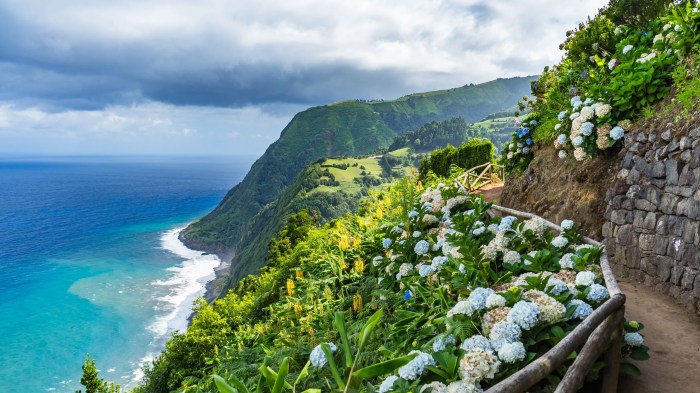
The Azores archipelago boasts a unique culinary tradition that blends the flavors of Portuguese cuisine with the bounty of its own land and sea.
The islands’ volcanic soil and mild climate create a fertile environment for agriculture, with an abundance of fresh fruits, vegetables, and dairy products. The surrounding Atlantic Ocean provides a wealth of seafood, including fish, shellfish, and crustaceans.
Traditional Dishes
One of the most iconic dishes of the Azores is cozido das Furnas, a stew made with meat, vegetables, and potatoes. It is traditionally cooked in underground geothermal vents, giving it a unique smoky flavor. Another popular dish is queijo da ilha, a semi-hard cheese made from cow’s milk. It has a distinctive tangy flavor and is often used in local dishes.
Importance of Local Agriculture and Fishing
The Azores’ gastronomy is heavily influenced by its local agriculture and fishing. The islands are home to several vineyards, producing a variety of wines, including the renowned verdelho. The fishing industry is also thriving, with the islands exporting fish and seafood to markets around the world.
The local cuisine of the Azores is a testament to the islands’ rich culinary heritage. It is a vibrant and diverse cuisine that reflects the unique flavors and traditions of this beautiful archipelago.
Arts and Crafts
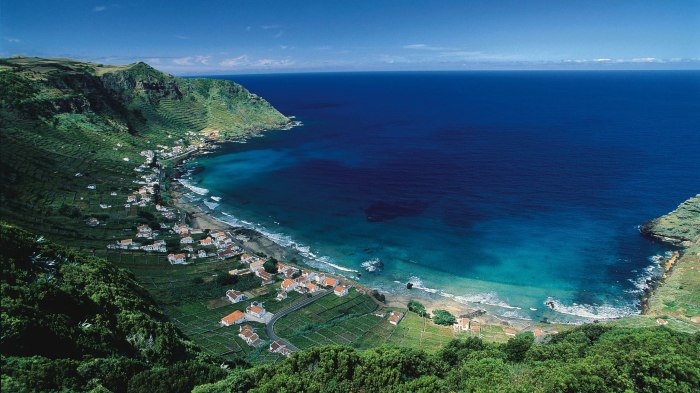
The Azores is a treasure trove of traditional arts and crafts that have been passed down through generations. These crafts not only showcase the region’s rich cultural heritage but also contribute to the local economy.
Local artisans play a vital role in preserving these traditional techniques, ensuring that they continue to thrive. They often use locally sourced materials, such as clay, wool, and reeds, to create unique and beautiful pieces.
Pottery
The Azores is renowned for its distinctive pottery, which features intricate designs and vibrant colors. Artisans use traditional techniques to create a variety of items, including bowls, plates, and vases. The pottery is often decorated with motifs inspired by the region’s natural surroundings, such as flowers, fish, and seabirds.
Embroidery
Embroidery is another popular craft in the Azores. Local artisans use fine threads to create intricate designs on fabrics, often depicting traditional scenes or motifs. The embroidery is often used to decorate clothing, tablecloths, and other household items.
Basket Weaving
Basket weaving is a traditional craft that has been practiced in the Azores for centuries. Artisans use reeds and other natural fibers to create sturdy and beautiful baskets. These baskets are often used for practical purposes, such as carrying produce or storing items, but they can also be decorative pieces.
Contemporary Artists
In recent years, contemporary artists in the Azores have begun to incorporate traditional techniques into their work. They use modern materials and innovative designs to create unique pieces that reflect the region’s cultural heritage while also pushing the boundaries of traditional crafts.
Final Review
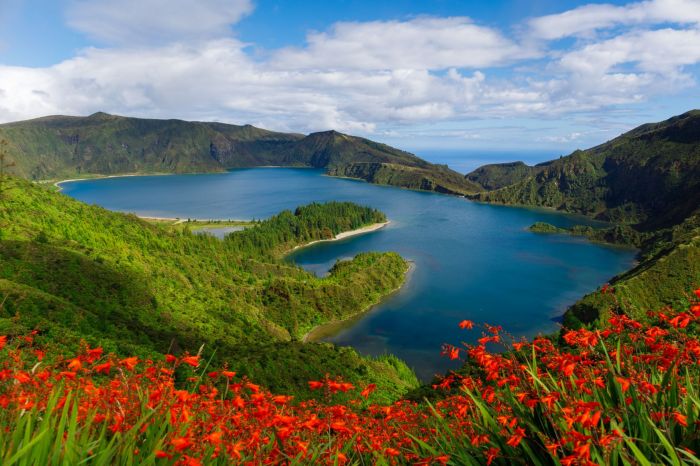
Whether you seek tranquility amidst pristine nature, cultural immersion in charming villages, or thrilling adventures in the great outdoors, the Azores has something to offer every traveler. As you bid farewell to these enchanting islands, you will carry with you memories that will forever inspire and ignite your wanderlust.
FAQ Corner: Azores
What is the best time to visit the Azores?
The Azores enjoys a temperate climate year-round, making it an ideal destination anytime. However, the spring and fall months (April-May and September-October) offer the most pleasant weather for outdoor activities.
How do I get to the Azores?
The Azores is accessible by air through its main airport, João Paulo II Airport (TER) on the island of Terceira. There are direct flights from major cities in Europe and North America.
What are the must-see attractions in the Azores?
The Azores is home to a wealth of natural and cultural attractions. Some of the must-sees include: Furnas Lake, Sete Cidades, Lagoa do Fogo, Ponta Delgada, and the historic center of Angra do Heroísmo.